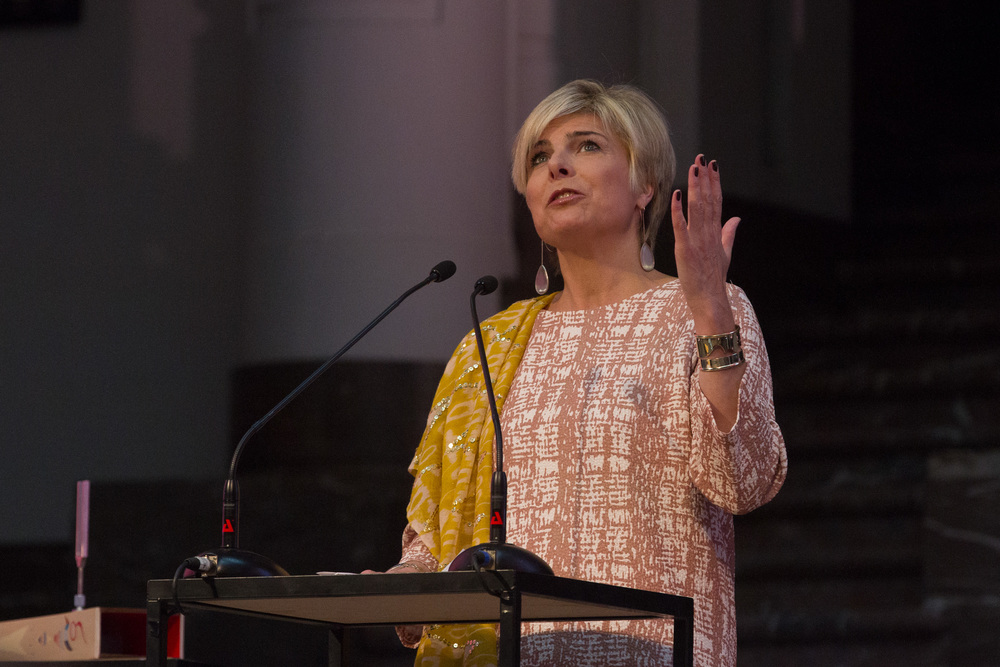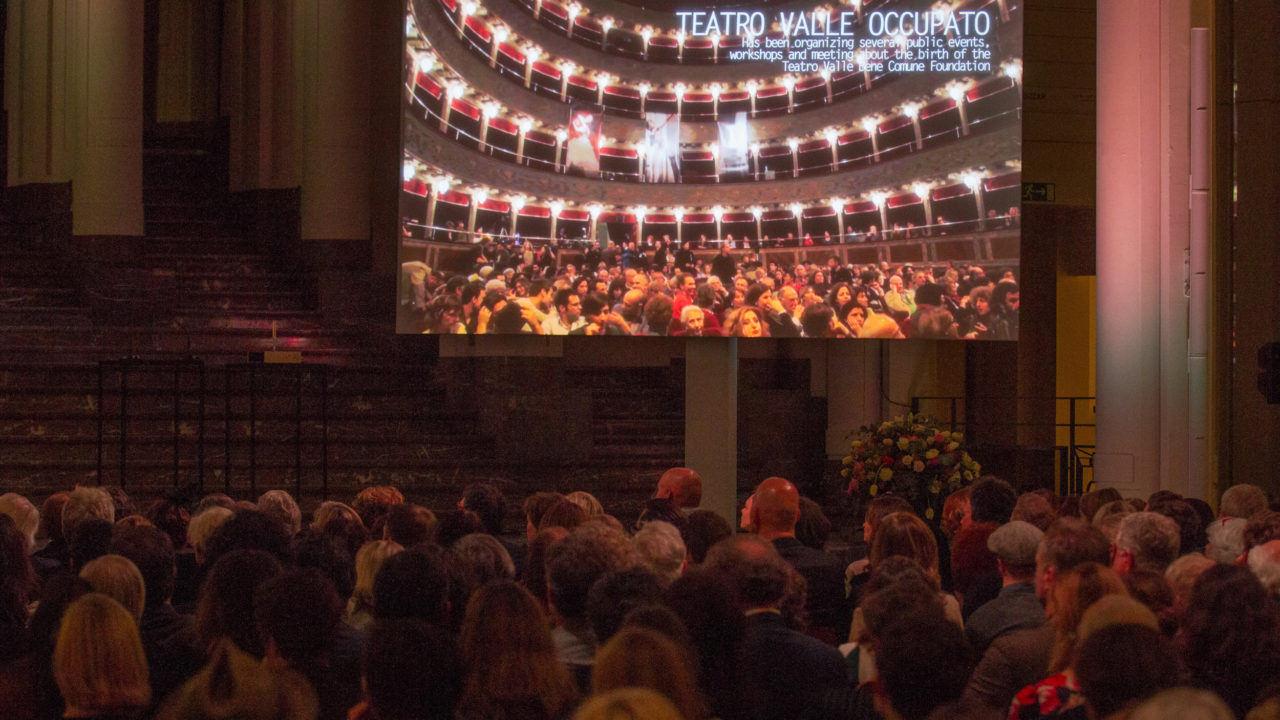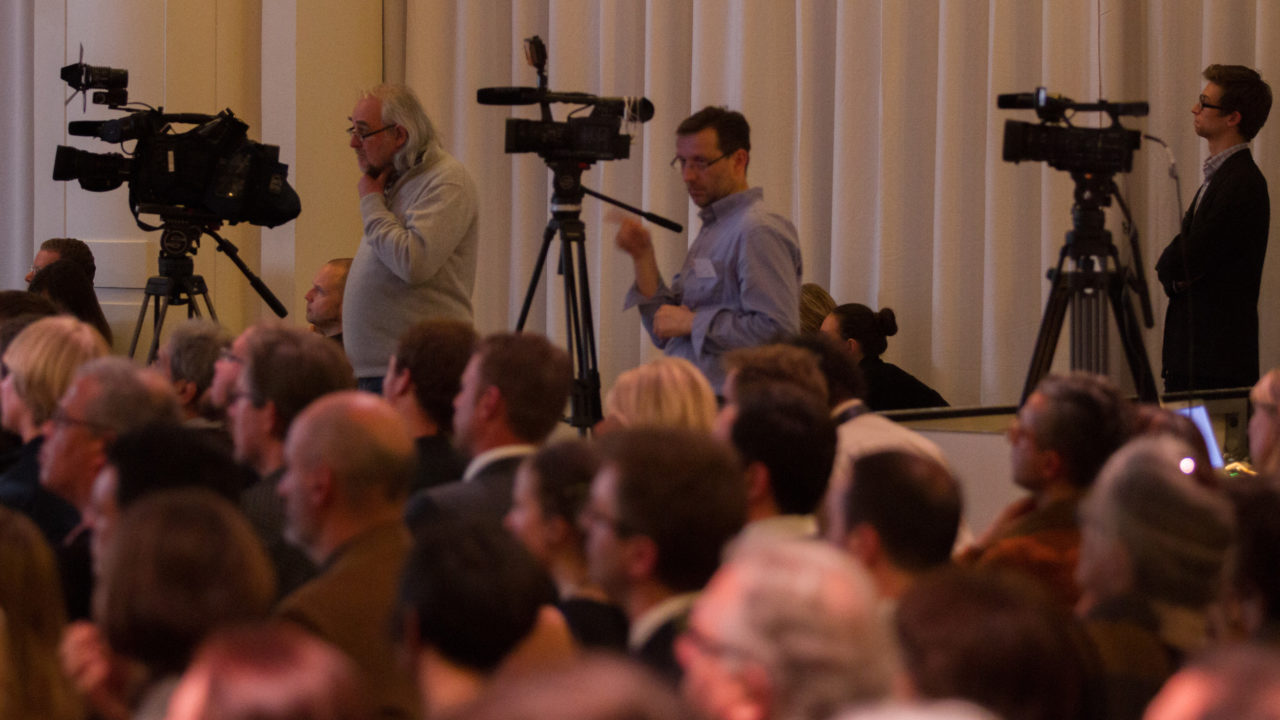2014 ECF Princess Margriet Award honours cultural activists who are reclaiming the public sphere
21 Mar 2014
With a live link via Skype to the Teatro Valle Occupato in Rome and dramatic music from percussion duo N.M.O (Navnlaust Mønster Opptog which translates as Untitled Pattern Parade), the stage was set for handing over the 2014 Princess Margriet Award to this year’s laureates – Italian theatre collective Teatro Valle Occupato and Croatian cultural activist Teodor Celakoski.
The awards came in the shape of specially crafted tuning forks mounted on a sound box and carefully calibrated by Dutch sound artist Nathalie Bruys for each of the laureates. They were handed out by HRH Princess Margriet of the Netherlands, the European Cultural Foundation’s former President, in the Horta Hall at heart of the Centre for Fine Arts, BOZAR in Brussels.
In her opening address, the European Cultural Foundation’s current President HRH Princess Laurentien of the Netherlands drew parallels between BOZAR’s impressive hall at the heart of cultural life and Brussels, packed with more than 350 people, and the ancient Greek agora – a gathering place where crowds of people would assemble to exchange goods and discuss all kinds of topics, from business to politics, from the daily news to the universe and the divine.

“It is no coincidence,” she said, “that the laureates we are celebrating today are re-opening the notion of agora as an inclusive space where different people come together to paint a new horizon. In Rome, Teatro Valle Occupato and in Zagreb, Teodor Celakoski employ culture as a radical project of learning, posing deep questions about what it means to create a space where people can openly entertain views other than their own, and in so doing, allow new and fresh perspectives.”
What connects the laureates of 2014, the year the European Cultural Foundation celebrates its 60th anniversary, is the way in which they have seized culture as a space of possibility. A space through which new traditions of ‘commoning’ – the practice of social cooperation against sweeping privatisation and top-down regulation of public resources – can grow.
The the European Cultural Foundation’s Director Katherine Watson guided the audience through the evening’s proceedings, explaining that, although this year’s laureates come from a very specific local context, they each reflect a wider movement of citizen engagement from around Europe and across the globe. In Rome, Teatro Valle Occupato has transformed and reclaimed a cultural space, turning it into a space of commons. While in Croatia, Teodor Celakoski is working from the field of culture to forge strong and lasting connections with other fields and catalysing broad citizen initiatives that engage people in the development of their city – and their future.
Accepting his award, laureate Teodor Celakoski acknowledged that the recognition was hugely encouraging for the collective movement he has helped to set in motion.

“The European dimension of this award is an encouragement and an opportunity pointing to the future,” he said, as he invited fellow change-makers onto the stage to share his award. “It gives more visibility and political encouragement.”
One of his colleagues and collaborators, guest speaker Emina Višnić, Director of POGON in Zagreb, added: “This award is actually the first institutional public acknowledgement of [Teodor’s] immense contribution. However, it is not a celebration of his lifework – he’s too young for that! – but it is a celebration of a collective action that is able to produce a positive social and political change, an action that is conceived and pursued beyond the sectorialism and narrow divides.”

Seven members of Teatro Valle Occupato – described by guest speaker Professor Ugo Mattei as “heroes of our time” – also shared their award via live Skype link with some of the 5,000-strong activists in Rome who have occupied one of Italy’s most prestigious theatres for the past three years.
“Both of these two awards are very brave and very ‘imprudent’,” said members of Teatro Valle Occupato and they dedicated the award to all the occupied spaces in Italy, Europe and the world. “Don’t be cautious, don’t be prudent,” they urged. “Fight for our rights.”
Before the ceremony drew to a close, PMA jury member and performance theorist and maker Bojana Cvejić explained why the international jury – including Tate Modern Director Chris Dercon and Dutch National Opera and Ballet Director Els van der Plas – had chosen Teatro Valle Occupato and Teodor Celakoski from a shortlist of cultural change-makers who had been nominated by experts from across Europe.
“Both of this year’s laureates show us how shared forms of action – from within and beyond the sphere of culture – can inspire us all to become more directly involved in the political decision-making that shape our lives,” she said, reading from the jury’s motivation. “And in a wider context of European crisis and austerity, they show us how culture can animate the public sphere.”

Debating the commons
Before the award ceremony, Federica Giardini and Sylvia de Fanti from Teatro Valle Occupato and Teodor Celakoski engaged in a lively debate with special guests Chantal Mouffe, who leads the Centre for the Study of Democracy at the University of Westminster, and Croatian cultural actor and philosopher Tomislav Medak. The debate was moderated by founding and artistic director of BAK, basis voor actuele kunst, Utrecht, Maria Hlavajova.
In an attempt to move Toward a Vocabulary of Another Institution – which was the title of the debate – Maria Hlavajova kicked off by asking “who owns culture and its institutions?” and how do we govern these institutions. Citing the laureates as good examples, she invited the speakers to propose another vision of what Europe could or should look like in bottom-up practices. Talking about the need to reflect on the state of Europe, she suggested we need a common European project that will provide an alternative to neo-liberal Europe.
Sylvia de Fanti explained how she and her fellow change-makers had occupied the Teatro Valle in Rome back in 2011 to save the theatre from an uncertain future. It was a process that was only meant to last for three days. But three years later, the group is in the process of establishing a foundation for the commons, defending culture as a common activity. And the group’s collective energy is inspiring similar initiatives all over Europe.
“The quality of the action was so extraordinary that it was impossible to leave,” explained Sylvia. “We took the time to discuss what was ours.”

Teodor Celakoski explained how he is working to establish civic-public partnerships – as opposed to public-private partnerships – in an attempt to reclaim the public sphere.
The debate ended with a memorable quote from Maria Hlavajova:
